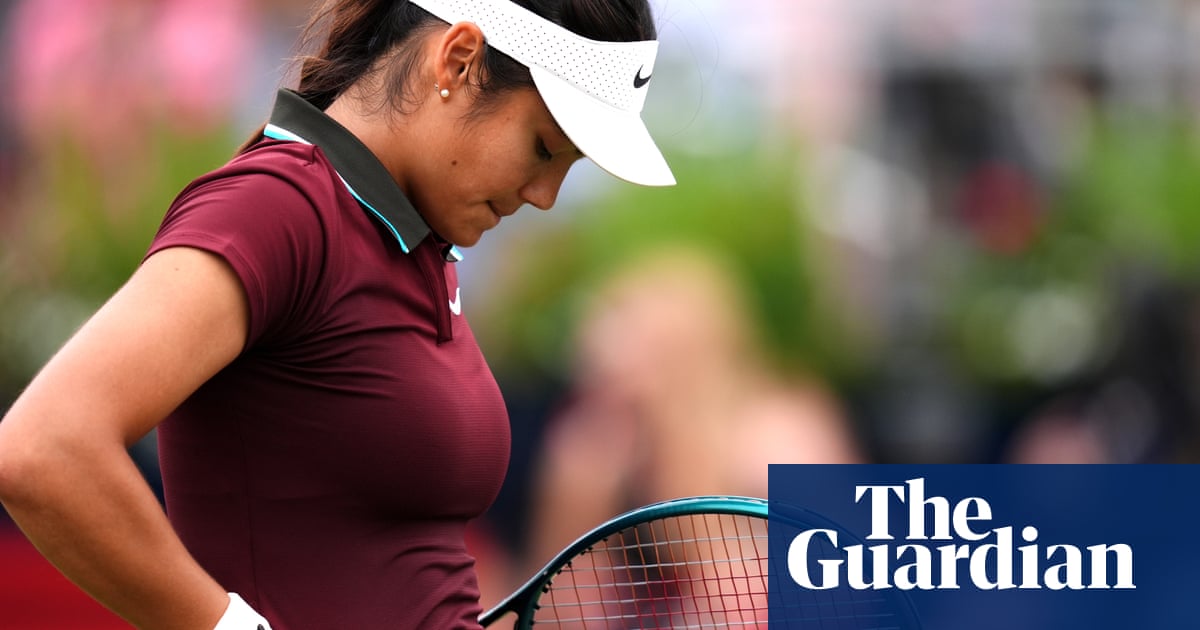Emma Raducanu’s positive week at Queen’s came to a difficult end as she was overpowered by Zheng Qinwen, the Chinese top seed and world No 5, who produced a stellar performance to reach her first grass court semi-final with a 6-2, 6-4 win.
After two months of trying to adapt her game to slow, unfamiliar clay courts, returning to the grass-court season on home soil has provided Raducanu with a helpful boost. She put together two impressive straight-sets wins against the Spanish qualifier Cristina Bucsa and Rebecca Sramkova, the world No 41.
This match, however, represented a significant step up. Over the past year, Zheng, who is just one month older than Raducanu, has firmly established herself as one of the best players in the world and a contender for all of the biggest tournaments, winning the Olympic gold medal in Paris and rising to her current ranking of No 5. However, Zheng has had minimal experience on grass and had only three wins on the surface before this season’s start. She narrowly survived McCartney Kessler, the world No 42, on Thursday evening after receiving a first-round bye.
Even so, Zheng has massive weapons at her disposal, which means she is more than capable of being effective here. Although it can be inconsistent, her first serve is devastating that is complemented by her vicious forehand and the 22-year-old is also one of the better athletes on the tour. Those assets were immediately visible. Although Raducanu tried to impose by attacking second serves on the rise and trying to dictate with her forehand, early on she was simply overpowered by one of the WTA Tour’s heavyweights. As Zheng served precisely and relentlessly attacked with both her forehand and backhand, the pace and weight on her groundstrokes completely overwhelmed Raducanu.
Raducanu has repeatedly said she has continued to manage her back after suffering a recurrence of spasms, which has been a continuous problem this year. She took an off-court medical timeout before the start of the second set to aid it. As she returned to court, Zheng eventually fell back to earth. She completely lost control of her serve, landing only 28% of her first serves at the start of set two after a brilliant 69% in the opening set, and her forehand errors subsequently began to pile up. Raducanu suffocated Zheng’s second serve and remained as she twice broke for a 3-0 lead.
After a dire run of serving at the start of the year, Raducanu has made significant changes to it, adopting a lengthier motion. Although it has improved, she can still lose confidence and rhythm. She became tentative behind her first serve after a couple of early double faults, which allowed Zheng to step inside the court and dominate. As Zheng regained her service rhythm, the incoming British No 1 was tasked with holding on to her serve in order to force. It came as little surprise when she double faulted on break point to relinquish the second break. Shortly after, Zheng had rolled through four consecutive games to close out the win.
Sign up toThe Recap
The best of our sports journalism from the past seven days and a heads-up on the weekend’s action
after newsletter promotion
This has been another positive week for Raducanu, who regains her status as British No 1 again on Monday and is not far from being a seed at Wimbledon. As has been the case for much of her season, though, she has performed well against lower ranked players but her game has often looked too underpowered against the best players in the world.
